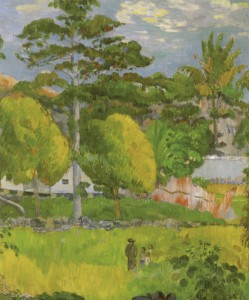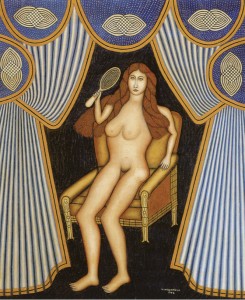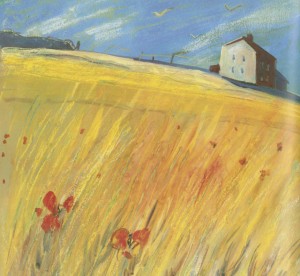Another Mary Oliver Monday
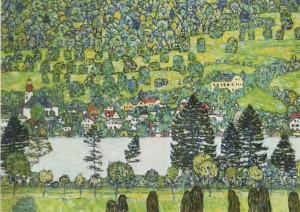 Blackwater Woods by Mary Oliver
Blackwater Woods by Mary Oliver
Look, the trees are turning their own bodies into pillars of light,
are giving off the rich fragrance of cinnamon and fulfillment,
the long tapers of cattails are bursting and floating away over the blue
shoulders of the ponds,
and every pond, no matter what its name is,
is nameless now.
Every year everything I have ever learned in my lifetime leads back to this:
the fires and the black river of loss whose other side is salvation,
whose meaning none of us will ever know.
To live in this world you must be able to do three things: to love what is mortal;
to hold it against your bones knowing your own life depends on it;
and, when the time comes to let it go,
to let it go.
(image from: Slope in a Forest on Attersee Lake, by Gustav Klimt)
Thanks for Everything
Last night at the Dharma Seed KM Group, we listened to a talk by my teacher, Lila Kate Wheeler, titled: The World of Experience. Lila is also a travel writer and novelist, and she often uses poems as part of her talks…but not just from the standard “dharma talk” poets.
Last night, she included this poem from John Giorno, an AIDS activist who spent a lot of time with Andy Warhol and friends.
 Thanks for Nothing, by John Giorno
Thanks for Nothing, by John Giorno
I want to give my thanks to everyone
for everything
And as a token of my appreciation
I want to offer back to you
All my good and bad habits —
magnificent, priceless jewels,
wish-fullfilling gems,
satisfying your every need and want
Thank you. Thank you. Thank you.
May all the chocolate I every ate
come rushing through your blood stream…
make you feel happy.
I give enormous thanks to all my lovers,
beautiful men with brilliant minds
and great artists.
May they come here and now
and make love to you.
May they hold you in their arms….
if you are attracted to any of them.
May they come back from the dead and do whatever is your pleasure.
Huge hugs to all the friends who betrayed me.
Big kisses to all the loves that failed.
I delight that your vacuum cleaner is sucking everything into your dirtbag.
You are none other than a reflection
of my own mind.
And America, thanks for the neglect.
I did it all without you.
Let us celebrate that you and I
never really existed.
Thanks for introducing me
to the face of my own naked mind.
Thanks for nothing.
(image from: Paper Source)
Mary Oliver Monday
How about a little Mary Oliver to start the week off right:
Those who disappointed, betrayed, scarified! Those who
would still put their hands upon me! Those who belong
to the past!
How many of us have weighted the years with groaning and
weeping? How many years have I done it how many nights
spent panting hating grieving, oh, merciless, pitiless remembrances!
I walk over the green hillsides, I lie down on the harsh, sun-
flavored blades and bundles of grass; the grass cares nothing
about me, it doesn’t want anything from me, it rises to its
own purpose, and sweetly, following the single holy dictum:
to be itself, to let the sky be the sky, to let a young girl
be a young girl freely–to let a middle-aged woman be, comfortably, a middle-aged woman.
Those bloody sharps and flats–those endless calamities of
the personal past. Bah! I disown them from the rest of my
life, in which I mean to rest.
(image: Landscape by Paul Gauguin)
Fellow Travelers
 How joyful to look upon the awakened
How joyful to look upon the awakened
And to keep company with the wise.
Following then the shining ones,
The wise, the awakened, the loving,
For they know how to work and forbear.
But if you cannot find
Friend or master to go with you,
Travel on alone–
Like a king who has given away his kingdom,
Like an elephant in the forest.
If the traveler can find
A virtuous and wise companion
Let him go with her joyfully
And overcome the dangers of the way.
Follow them
As the moon follows the path of the stars.
— from the Dhammapada, translated by Thomas Byrom (with gender pronouns edited by me)
— image from Steampunk Tarot by Curly Cue Design
Luminous is the Mind
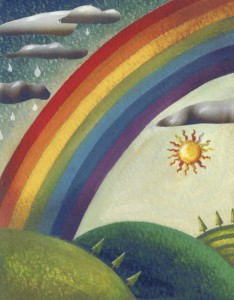 Luminous is the mind, brightly shining, but it is colored by the attachments that visit it. This unlearned people do not really understand, and so do not cultivate the mind.
Luminous is the mind, brightly shining, but it is colored by the attachments that visit it. This unlearned people do not really understand, and so do not cultivate the mind.
Luminous is the mind, brightly shining, and it is free of the attachments that visit it. This the noble follower of the way really understands; so for them there is cultivation of the mind.
— from the Anguttara Nikaya, translated by Gil Fronsdal
Who’s There?
As part of this month’s DPP homework, we are asked to read and reflect on this poem by Stephen Batchelor:
Were mind and matter me,
I would come and go like them,
If I were something else,
They would say nothing about me.
What is mine
When there is no self?
Were self-centeredness eased,
I would not think of me and mine–
There would be no on there
To think them.
What is inside is me,
What is outside is mine–
When these thoughts end,
Compulsion stops,
Repetition ceases,
Freedom dawns.
Fixations spawn thoughts
That provoke compulsive acts–
Empiness stops fixations.
Buddhas speak of “self”
And also teach “no self”
And also say “there’s nothing
Which is either self or not.”
When things dissolve,
There’s nothing left to say.
The unborn and unceasing
Are already free.
Buddha said: “it is real,”
And “it is unreal,”
And “it is both real and unreal,”
And “it is neither one nor the other.”
It is all at ease,
Unfixatable by fixations,
Incommunicable,
Inconceivable,
Indivisible.
You are not the same as or different from
Conditions on which you depend;
You are neither severed from
Nor forever fused with them–
This is the deathless teaching
Of Buddhas who care for the world.
When buddhas don’t appear
And their followers are gone,
The wisdom of awakening
Burst forth by itself.
(image: “Seated Nude with Mirror,” by Morris Hirschfield)
The Fragrance of Virtue
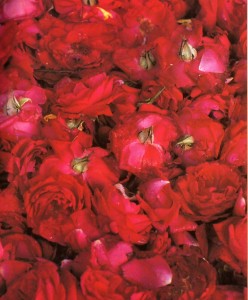 The perfume of sandalwood,
The perfume of sandalwood,
Rosebay or jasmine
Cannot travel against the wind.
But the fragrance of virtue
Travels even against the wind,
As far as the ends of the world.
Like garlands woven from a heap of flowers,
Fashion from your life as many good deeds.
–from the Dhammapada,
translated by Thomas Byrom
We Are What We Think
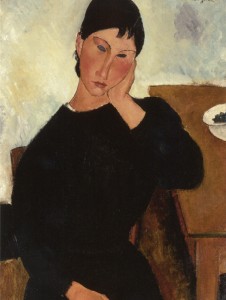 We are what we think.
We are what we think.
All that we are arises with our thoughts.
With our thoughts we make the world.
Speak or act with an impure mind
And trouble will follow you
As the wheel follows the ox that draws the cart.
We are what we think.
All that we are arises with our thoughts.
With our thoughts we make the world.
Speak or act with a pure mind
And happiness will follow you
As your shadow, unshakable.
How can a troubled mind
Understand the way?
Your worst enemy cannot harm you
As much as your own thoughts, unguarded.
But once mastered,
No one can help you as much,
Not even your father or your mother.
— from the Dhammapada, translated by Thomas Byrom
(image: Elvira Resting at a Table, by Amedeo Modigliani)
Waking Up
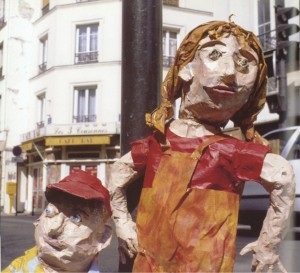 I was listening to another great talk by Jack Kornfield last night, this one titled: The Gates of Awakening, in which he quotes from Thomas Merton‘s famous “Fourth and Walnut” epiphany:
I was listening to another great talk by Jack Kornfield last night, this one titled: The Gates of Awakening, in which he quotes from Thomas Merton‘s famous “Fourth and Walnut” epiphany:
“In Louisville, at the corner of Fourth and Walnut, in the center of the shopping district, I was suddenly overwhelmed with the realization that I loved all of those people, that they were mine and I theirs, that we could not be alien to one another even though we were total strangers. It was like waking from a dream of separateness…..
“It was as if I suddenly saw the secret beauty of their hearts, the depths of their hearts where neither sin nor desire nor self-knowledge can reach, the core of their reality, the person that each one is in God’s eyes.
“If only they could all see themselves as they really are. If only we could see each other that way all the time. There would be no more war, no more hatred, no more cruelty, no more greed….I suppose the big problem would be that we would fall down and worship each other.”
(image: “A Whole World,” by Couprie and Louchard)
Grasped by What We Cannot Grasp
I was listening to a recorded talk last night by one of my teachers, Lila Kate Wheeler, given at the one-month retreat that’s going on right now at Spirit Rock. She begins (and ends) with this poem, which strikes me as a beautiful description of our meditation practice. I offer it here for your reflection.
My eyes already touch the sunny hill,
going far ahead of the road I have begun.
So we are grasped by what we cannot grasp;
it has inner light, even from a distance–
and it changes us, even if we do not reach it,
into something else, which, hardly sensing it,
we already are; a gesture waves us on
answering our own wave…
but what we feel is the wind on our faces.
— Rainer Maria Rilke, translated by Robert Bly
(image: from “A Whole World,” by Couprie and Louchard)

